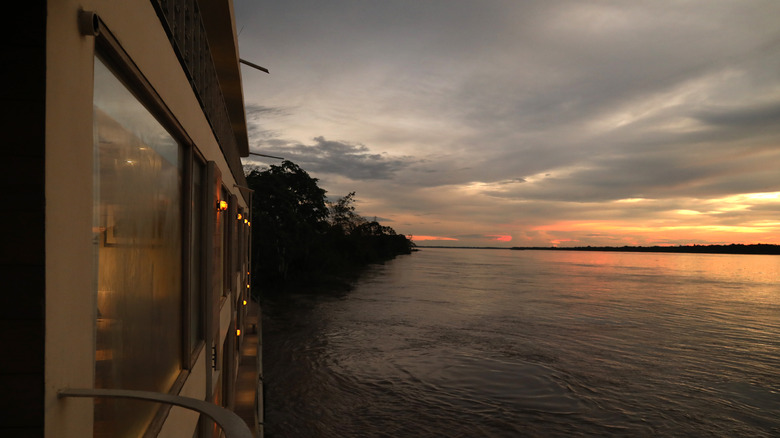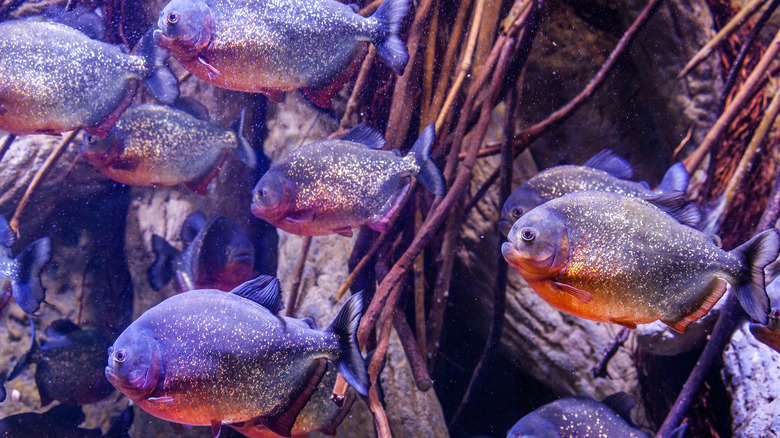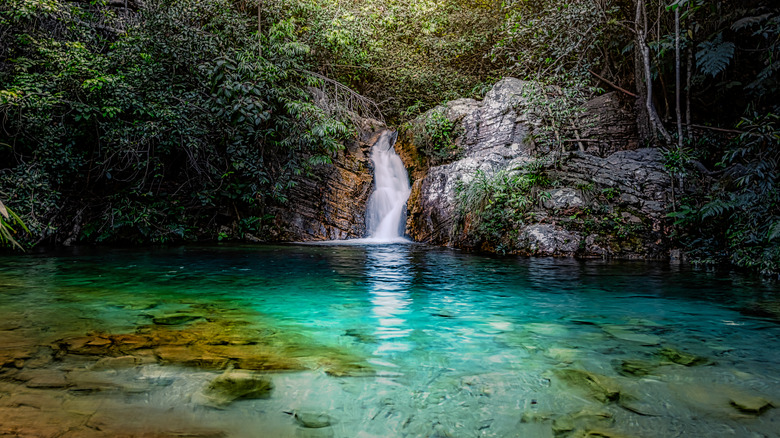How Worried About Piranha Attacks Should You Really Be On A South American Vacation?
It sounds like something out of an adventure comic: Suddenly realizing that the water you're swimming in is full of piranhas with razor-sharp teeth, hungry for human flesh. But how likely is that to actually happen in real life? Pools under villains' trapdoors are not actually their native habitat — these fish are in fact native to South America. If a vacation to South America is on your bucket list, you might be wondering about these toothy little fish and how big a risk they actually pose to humans. You should have a healthy respect for these interesting creatures, as people have been seriously injured and even permanently maimed by them, but the reality is, you probably won't be in a situation where you'll encounter piranhas. And even if you are, they probably won't be interested in eating you alive.
One thing to consider is where piranhas usually live. If you're traveling to Rio de Janeiro to walk the "world's most famous beach," Copacabana Beach, you don't have to worry about piranhas in the gorgeous blue waves. They generally live in freshwater rivers and streams, or in muddy, marshy areas near bodies of water that often flood. For instance, many species of piranha live in the Amazon, which is considered among the most dangerous rivers in the world. While there are exceptions, the murky waters that they tend to call home aren't usually the kinds of places travelers are eager to dive into for a swim ... But that's not a guarantee.
Will piranhas attack people?
If you do find yourself in the water with piranhas while you're on vacation in South America, will they eat you alive? As exciting as the stories about ravenous monster fish are, they aren't very accurate. In reality, if you were to wade into a pool of piranhas, the fish would probably ignore you — or actively avoid you.
While piranhas definitely eat meat, they usually only hunt for little animals, like smaller fish, frogs, and bugs. They aren't even obligate carnivores; they eat plant matter, too. If something larger, like a person, dies or is dying and thrashing in the water, hungry fish will certainly take a bite, but healthy travelers aren't usually at risk. In fact, while injuries have happened and human bodies have been scavenged by these fish, it's unclear whether or not a living person has actually been killed by piranhas.
Even if hungry piranhas are unlikely to swarm you and eat you alive, they do have some serious teeth and a powerful bite. You definitely don't want one to chomp down on your feet. Horrifically, that's exactly what happened to one little girl in Brazil, who lost two toes to a piranha in a popular swimming lake called Lago Sul and had to be rushed to the hospital. In another incident, eight tourists were bitten by piranhas near their resort near Manaus. In most cases, though, these injuries are not particularly severe and the fish didn't go in for another bite. In fact, according to a Newsweek report, those bitten shared that while they felt some pain, they didn't realize it was a bite until they got out of the water and heard others had been bitten.
How serious are piranha bites and what can you do to avoid them?
To avoid getting bitten, you should definitely avoid going into water where there are piranha warning signs or where other swimmers report seeing them. If you hear that others have been bitten, definitely stay on dry land. In general, avoid lakes, ponds, and pools that have become more shallow due to drought. In these places, high concentrations of fish compete for scarce food, and they may be driven to take a bite of a large animal. You also should never attempt to fish for piranhas, as many bites have occurred when the fish were removed from the water.
If you see piranhas in the water, or worse, get a nip from one, move calmly and deliberately to the shore. It's believed that panicked splashing may confuse the fish into thinking you're a dying animal, which would be easy prey. If you do get bitten, alert everyone else in the area as quickly as possible so no one else gets hurt.
Treat the injury like you would any other serious cut that you get out in nature: Apply pressure to slow the bleeding, then seek medical help. Even if the bite doesn't seem that bad, it's never safe to swim in natural bodies of water with an open wound. And in the kind of murky water piranhas prefer, a cut can invite infections that may be worse than the bite itself.


